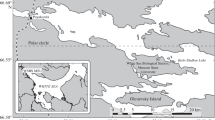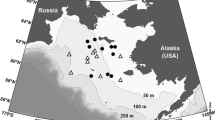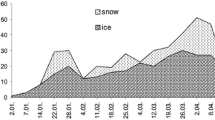Summary
Vertical and seasonal variations of ice algae and phytoplankton were studied in relation to their physico-chemical environments in Frobisher Bay from 1979 to 1986. The biomass, estimated by both chlorophyll a concentrations and cell counts, was greater in the ice algae than in the phytoplankton in the underlying sea-water during winter and spring. Algal distribution in the sea ice varied vertically and seasonally, while in the underlying water column the phytoplankton distribution was much less variable. The ice algal bloom occurred at the bottom of the ice, particularly in the lower 5 cm during late spring, while the phytoplankton bloom took place at depths between 1 and 10 m during early summer after the ice bloom was over. The community structure of the ice algae changed from pennate to centric diatoms as the ice melted. The centrics dominated through the fall, and then decreased as the pennates increased in dominance when the ice formed again in winter. Species diversity and number were greater in the sea ice than in the seawater, but they were similar vertically within each habitat. The evenness of the species distribution did not vary with ice thickness or water depth. Species composition, abundance and dominance of ice algae and phytoplankton continually change both vertically and seasonally. The differential abilities of the species to attain maximal growth rates under various environmental conditions may result in species succession. Evidence is given for the major role of environmental factors regulating the dynamics of ice algae and phytoplankton.
Similar content being viewed by others
References
Bates SB, Cota GF (1986) Fluorescence induction and photosynthetic responses of arctic ice algae to sample treatment and salinity. J Phycol 22:421–429
Bergmann MA, Welch HE, Butler-Walker JE, Siferd TD (1991) Ice algal photosynthesis at Resolute and Saqvaqjuac in the Canadian Arctic. J Mar Syst 2:43–52
Braarud T, Foyn B, Hasle GR (1958) The marine and freshwater phytoplankton of the Dramsfjord and the adjacent part of the Oslofjord, March–December 1951. Hvalradets Skr 43:1–102
Cota GF (1985) Photoadaptation of high Arctic ice algae. Nature 315:219–222
Goldman JC, Ryther JH (1976) Temperature — species composition in mass cultures of influenced phytoplankton. Biotechnol Bioeng 18:1125–1144
Gosselin M, Legendre L, Demers S, Ingram RG (1985) Responses of sea-ice microalgae to climatic and fortnightly tidal energy inputs (Manitounuk Sound, Hudson Bay). Can J Fish Aquat Sci 42:999–1006
Grainger EH (1979) Primary production in Frobisher Bay, Arctic Canada. In: Dunbar MJ (ed) Marine production mechanisms. International Biological Programme 20. Cambridge Univ Press, Cambridge, pp 9–30
Grainger EH, Hsiao SIC (1990) Trophic relationships of the sea-ice meiofauna in Frobisher Bay, Arctic Canada. Polar Biol 10:283–292
Grant WS, Horner R (1976) Growth responses to salinity variation in four arctic ice diatoms. J Phycol 12:180–185
Horner R (1985) Ecology of sea ice microalgae. In: Horner RA (ed) Sea ice biota. CRC Press, pp 83–103
Hsiao SIC (1980) Quantitative composition, distribution, community structure and standing stock of sea ice microalgae in the Canadian Arctic. Arctic 33:768–793
Hsiao SIC (1985) The growth of arctic marine phytoplankton in Frobisher Bay. Arctic 38:31–38
Hsiao SIC (1988) Spatial and seasonal variations in primary production of sea ice microalgae and phytoplankton in Frobisher Bay, Arctic Canada. Mar Ecol Prog Ser 44:275–285
Jeffrey W, Humphrey GF (1975) New spectrophotometric equations for determining chlorophylls a, b, c1 and c2 in higher plants, algae and natural phytoplankton. Biochem Physiol Pflanz 167:191–194
Margalef R (1977) Ecosystems diversity differences: poles and tropics. In: Dunbar MJ (ed) Polar oceans. Arctic Institute of North America, Calgary, Alberta, pp 367–375
Parsons TR, Takahashi M, Hargave B (1984) Biological oceanographic processes, 3rd edn. Pergamon Press, Oxford, 330 pp
Pielou EC (1975) Ecological diversity. Wiley & Sons, New York, 165 pp
Porter KG (1977) The plant-animal interface in freshwater ecosystems. Am Sci 65:159–170
Poulin M, Cardinal A, Legendre L (1983) Response d'une communaute de diatomees de glace a un gradient de salinite (baie d'Hudson). Mar Biol 76:191–202
Raymont JEG (1980) Plankton and productivity in the ocean, 2nd edn, vol 1. Phytoplankton. Pergamon Press, Oxford, 489 pp
Reed C (1978) Species diversity in aquatic microecosystems. Ecology 59:481–488
Shannon CE, Weaver W (1949) The mathematical theory of communication. Univ Illinois Press, Urbana, 125 pp
Starr M, Himmelman JH, Therriault JC (1991) Coupling of nauplii release in barnacles with phytoplankton blooms: a parallel strategy to that of spawning in urchins and mussels. J Plankton Res 13:561–571
Strickland JDH, Parsons TR (1972) A practical handbook of sea-water analysis. Bull Fish Res Board Can 167:1–310
Welch HE, Bergmann MA (1989) Seasonal development of ice algae and its prediction from environmental factors near Resolute, N.W.T., Canada. Can J Fish Aquat Sci 46:1793–1804
Author information
Authors and Affiliations
Rights and permissions
About this article
Cite this article
Hsiao, S.I.C. Dynamics of ice algae and phytoplankton in Frobisher Bay. Polar Biol 12, 645–651 (1992). https://doi.org/10.1007/BF00236987
Received:
Accepted:
Issue Date:
DOI: https://doi.org/10.1007/BF00236987




